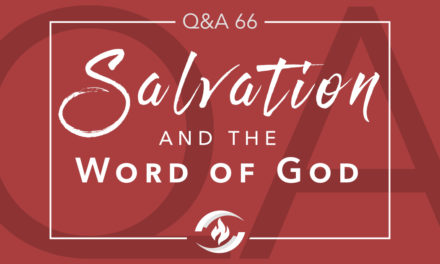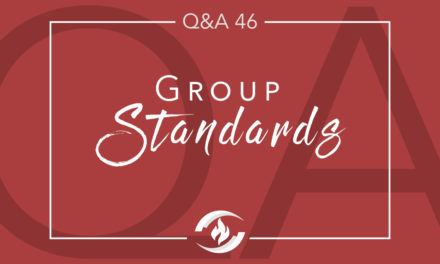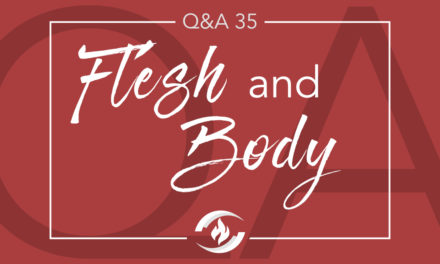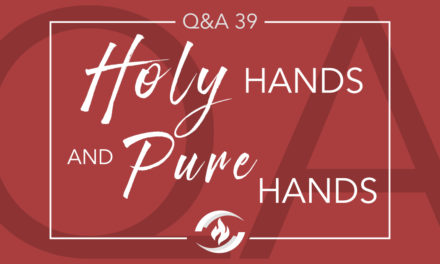Q.
Hello Mr. Van Gelderen,
Very recently I purchased your book, Assurance of Salvation. I would like to ask for your viewpoint about the verses in Hebrews 6:4-8, 10:26-29? I know the Lord’s word never contradicts itself. I was wondering if you could explain about these verses to me? I found another of your books to be very encouraging because it showed me I wasn’t the only one dealing with different things. I was thankful to the Lord for the encouragement.
Thank you for your time.
A.
Hello,
Many have wondered about these two passages. Thanks for inquiring. The passages under discussion are as follows:
Hebrews 6:4-8
“For it is impossible for those who were once enlightened, and have tasted of the heavenly gift, and were made partakers of the Holy Ghost, And have tasted the good word of God, and the powers of the world to come, If they shall fall away, to renew them again unto repentance; seeing they crucify to themselves the Son of God afresh, and put him to an open shame. For the earth which drinketh in the rain that cometh oft upon it, and bringeth forth herbs meet for them by whom it is dressed, receiveth blessing from God: But that which beareth thorns and briers is rejected, and is nigh unto cursing; whose end is to be burned.”
Hebrews 10:26-29
“For if we sin wilfully after that we have received the knowledge of the truth, there remaineth no more sacrifice for sins, But a certain fearful looking for of judgment and fiery indignation, which shall devour the adversaries. He that despised Moses’ law died without mercy under two or three witnesses: Of how much sorer punishment, suppose ye, shall he be thought worthy, who hath trodden under foot the Son of God, and hath counted the blood of the covenant, wherewith he was sanctified, an unholy thing, and hath done despite unto the Spirit of grace?”
Various grids of theology (belief systems) clash over the meaning of these verses. One theological grid claims the people in these passages were not saved. Another theological grid claims they were saved but lost their salvation. But as is often the case, there is a third interpretation, one that is not a synthesis of the other positions. It is a third, distinct grid.
First, let’s consider the immediate context of each passage to reveal whether the audience is assumed to be saved or unsaved.
Hebrews 6 explicitly assumes the audience is saved based on the following:
- First, the opening verse of the chapter assumes the readers are believers. The verse states, “Therefore leaving the principles of the doctrine of Christ (i.e.: moving beyond the elementary principles of salvation in Christ), let us go on unto perfection (let us move on to maturity); not laying again the foundation of repentance from dead works, and of faith toward God (not reviewing the foundation of changing what you believe from self-works to faith in God)”. Clearly, the author desires to move beyond the initial matter of salvation to maturing.
- The use of us in Hebrews 6:1 assumes that both author and readers are believers (“let us go on unto perfection”).
- Also, when addressing those who are hindered from maturing, the author assumes they are saved by referring to them as having “tasted of the heavenly gift, and were made partakers of the Holy Ghost, And have tasted the good word of God, and the powers of the world to come.” The word tasted (used twice) is the same word used of Jesus when it says that He “should taste death for every man” (Heb. 2:9). Clearly, on the cross, Jesus tasted or experienced death for every man. Therefore, noting that the readers have tasted, it follows that they have experienced the heavenly gift and the good word of God, and the powers of the world to come. This is more than the convicting work of the Holy Spirit. The word partakers involves actual participation.
- Finally, the verse following this passage is directed toward readers that are saved: “But, beloved, we are persuaded better things of you, and things that accompany salvation, though we thus speak” (Heb. 6:9). The author calls the readers beloved and speaks of things that accompany salvation. Clearly, the author assumes the readers are saved.
Likewise, the context of Hebrews 10 indicates an assumption that the audience is saved:
- First, the verse immediately preceding the passage in question admonishes “not forsaking the assembling of ourselves together,” (Heb. 10:25) which assumes the readers are believers.
- The pronoun we is used in the opening phrase of our passage: “For if we sin wilfully after that we have received the knowledge of the truth….” The author includes himself when using the term which assumes that both author and readers are saved.
- The author also makes use of past tense verbs with salvific concepts that assume the audience already has been saved—have received the knowledge of the truth (Heb. 10:26) and was sanctified (Heb. 10:29).
- Finally, the verse immediately following our passage says, “The Lord shall judge his people” (Heb. 10:30). The phrase his people assumes a reference to believers. The judgment, expanded two chapters later, refers to chastening. Whom the Lord loves He chastens and chastises every son whom He receives (Heb. 12:6). Chastening is for sons (children of God), not for the unsaved.
Having established that both passages address believers, what then is the correct interpretation? The bottom line meaning is that if believers in Jesus ignore the revival road of honesty (in order that the blood might cleanse) and faith (in order that the Spirit might enable), there is no other provision—and willful backsliding will be met with the chastening hand of God.
Hebrews 6 warns it is impossible to renew backsliders to repentance should they refuse to take the revival road. They are ignoring the work of Christ on the cross and His blood which is available to cleanse, and by ignoring this provision in Jesus they are putting Him to an open shame (Heb. 6:6). Since believers are given access to the power of the cross, a rejection of that ongoing provision leaves no hope of victory. There is no other way back. One cannot get saved again. One must depend on the victory of Jesus for cleansing and life, not just for salvation.
The revival road leads into the fruitfulness of the Spirit-filled life pictured in Hebrews 6:7 while the road of selfish unbelief leads to the unprofitable life to be exposed at the Judgment Seat depicted in Hebrews 6:8.
Expanding on the sequence of thought in Hebrews 6, chapter 10 warns that those who ignore the provision of the blood to cleanse trample underfoot the Son of God by not valuing the blood. It also warns that those who ignore the provision of the Holy Spirit to enable insult the Spirit of grace (Heb. 10:29). Willful backsliding rejects the provision of the blood by not walking in the light (cf. 1 John 1:7, 9) and the provision of the Spirit by not walking in the Spirit (cf. Gal. 5:16).
God will chasten those who willfully ignore taking the revival road of honesty (confession) to access cleansing and faith to access the Spirit’s leadership and power (Heb. 10:30-31). Therefore, the author of Hebrews urges the readers to endure in faith so they mature and avoid bringing upon themselves negative consequences of unbelief as children of God (Heb. 10:32-39). The just not only get saved by faith, they are to live by faith (Heb. 10:38).
We’d love to hear your thoughts on this subject in the comments section below! If you have a question on another subject, we welcome you to make a submission by clicking here:












Excellent expository interpretation of two of the most difficult and misinterpreted passages in the entire New Testament. Thankful for the great clarity.
Thanks for the encouragement
Amen! Very helpful in giving clarity to these two difficult passages.
Appreciate the encouragement
Hello Mr. Van Gelderen,
I went over you explanation a couple of times. Thank you for explaining your viewpoint on Hebrews 6 and 10. If it is alright to do so I would like to ask another question? I believe all of the Lord’s word and I know He holds those that are His. And I know Jesus’s grace is sufficient. And I know salvation is through faith in Christ alone and not by works. I also see verses like 2 Peter 2:20-21. And others. Could you explain about 2 Peter 2:20-21 and about eternal security?
2 Peter 2 is addressing false teachers. There is a textual variant in verse 18. The wording “clean escaped” is the idea of “just fled.” The danger addresses those who flee false teachers and their pollution through enough truth about Jesus, but never actually flee to Jesus in faith for salvation. This is the same error the false teachers made. Since they had greater knowledge of truth they have greater responsibility.